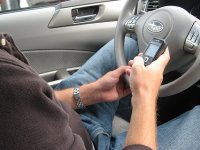New research into British driving habits reveals that many of us have become too self-assured behind the wheel and are giving in to a number of dangerous and illegal driving habits with men being worse than women. There have been increases in those driving without a seat belt, driving the morning after the night before and also road rage. Despite the law, motorists are still putting themselves and others in danger as they continue to speed, use mobile phones and text behind the wheel.
So why do we so often become careless behind the wheel and what can we do to make sure we are not putting ourselves and others at risk?
Joining us in the studio is Ben Tyte, Sainsbury's Car Insurance Manager.

